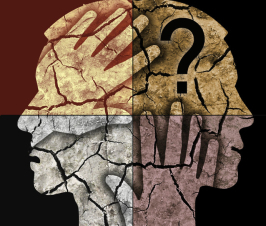A new study has concluded that a poor diet is directly linked to mental health complaints regardless of factors such as gender, education, age, economic or marital status.1 A holistic approach to mental health issues often addresses dietary factors, but to have a conventional study support this link may be a step in giving individuals a sense of control over their mental health.
The holistic approach to mental health issues often addresses dietary factors
The study appeared in the International Journal of Food and Sciences and Nutrition. It found specifically that adults residing in California, who ate a more unhealthy diet were more likely to report symptoms of moderate to severe psychological distress than individuals who ate healthier.
This study is similar to other studies conducted in other countries that have found a link between increased sugar consumption, fried and processed foods, and processed grains with depression, and bipolar disorders. Jim E. Banta, PhD, MPH, associate professor at Loma Linda University School of Public Health and lead author of the study is quoted as saying:
“This and other studies like it could have big implications for treatments in behavioral medicine.” “Perhaps the time has come for us to take a closer look at the role of diet in mental health, because it could be that healthy diet choices contribute to mental health. More research is needed before we can answer definitively, but the evidence seems to be pointing in that direction.”
Associate professor Banta cautions that the link found between poor diet and mental illness is not a causal relationship
Banta cautioned that the link found between poor diet and mental illness is not a causal relationship. Still, he said the findings from California build upon previous studies and could affect future research and the approaches that healthcare providers administer for behavioral medicine treatments.
The study itself reviewed almost a quarter of a million telephone surveys over a ten-year period of time. This was part of the multi-year California Health Interview Survey (CHIS). The survey included extensive socio-demographic info including health status and behaviors, and included multiple ethnic groups.
Findings of the study
The study found that nearly 17 percent of California adults are likely to suffer from mental illness — 13.2 percent with moderate psychological distress and 3.7 percent with severe psychological distress.
The study stated that the team’s findings provide “additional evidence that public policy and clinical practice should more explicitly aim to improve diet quality among those struggling with mental health.” It also stated that “dietary interventions for people with mental illness should especially target young adults, those with less than 12 years of education, and obese individuals.”
 Razi Berry is the founder and publisher of the journal Naturopathic Doctor News & Review that has been in print since 2005 and the premier consumer-faced website of naturopathic medicine, NaturalPath. She is the host of The Natural Cancer Prevention Summit and The Heart Revolution-Heal, Empower and Follow Your Heart, and the popular 10 week Sugar Free Summer program. From a near death experience as a young girl that healed her failing heart, to later overcoming infertility and Chronic Fatigue Syndrome and Fibromyalgia through naturopathic medicine, Razi has lived the mind/body healing paradigm. Her projects uniquely capture the tradition and philosophy of naturopathy: The healing power of nature, the vital life force in every living thing and the undeniable role that science and mind/body medicine have in creating health and overcoming dis-ease. Follow Razi on Facebook at Razi Berry and join us at Love is Medicine to explore the convergence of love and health.
Razi Berry is the founder and publisher of the journal Naturopathic Doctor News & Review that has been in print since 2005 and the premier consumer-faced website of naturopathic medicine, NaturalPath. She is the host of The Natural Cancer Prevention Summit and The Heart Revolution-Heal, Empower and Follow Your Heart, and the popular 10 week Sugar Free Summer program. From a near death experience as a young girl that healed her failing heart, to later overcoming infertility and Chronic Fatigue Syndrome and Fibromyalgia through naturopathic medicine, Razi has lived the mind/body healing paradigm. Her projects uniquely capture the tradition and philosophy of naturopathy: The healing power of nature, the vital life force in every living thing and the undeniable role that science and mind/body medicine have in creating health and overcoming dis-ease. Follow Razi on Facebook at Razi Berry and join us at Love is Medicine to explore the convergence of love and health.

















